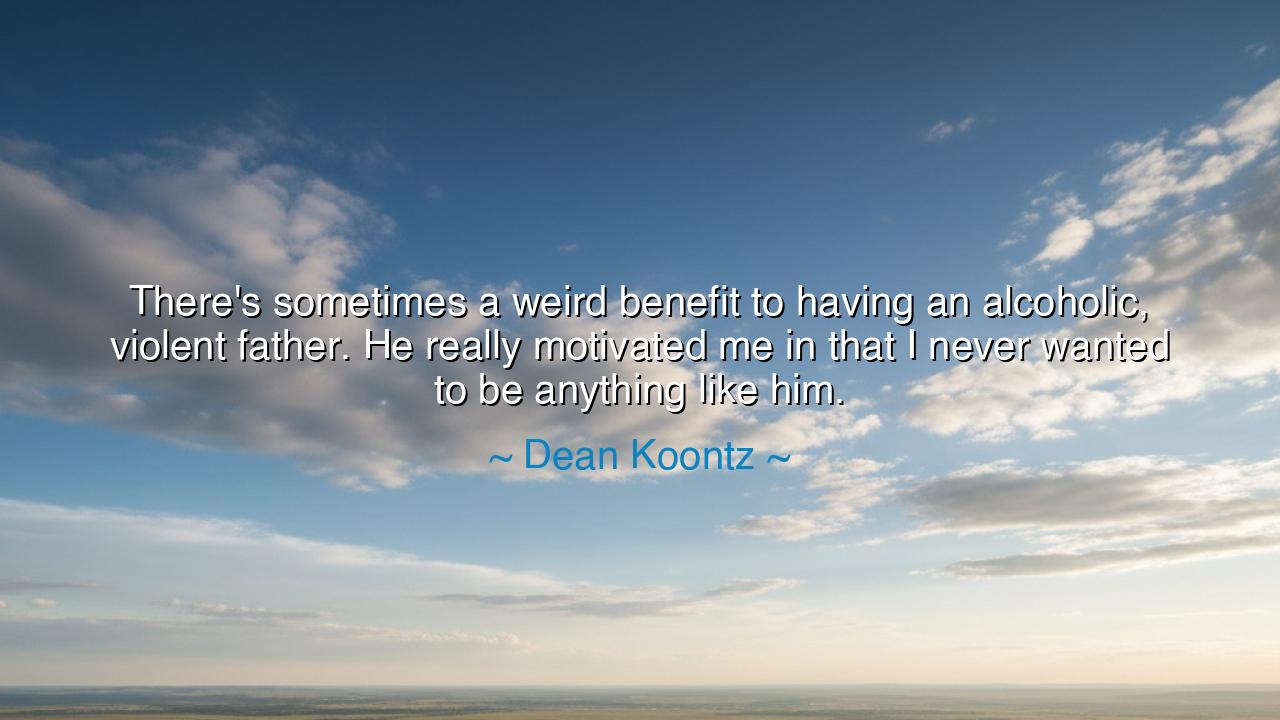
There's sometimes a weird benefit to having an alcoholic, violent
There's sometimes a weird benefit to having an alcoholic, violent father. He really motivated me in that I never wanted to be anything like him.






Hear the words of Dean Koontz, the master of story and shadow, who once confessed: “There’s sometimes a weird benefit to having an alcoholic, violent father. He really motivated me in that I never wanted to be anything like him.” These are not words of bitterness, but of transformation. They speak to the mysterious alchemy of pain — how suffering, when faced with courage, can become a forge for greatness. The child who grows up in fear learns to build inner strength; the soul that has walked through darkness becomes a lantern for others. Koontz, in his humility, teaches that from even the most broken origins, a new and nobler path can rise.
The origin of this quote lies in the author’s own childhood — one scarred by hardship but redeemed by perseverance. Dean Koontz, known for his novels that explore the battle between light and shadow, lived that battle long before he wrote of it. His father was an alcoholic, prone to rage and cruelty, a man whose instability cast a long shadow over the home. Yet, instead of letting that shadow define him, Koontz turned it into contrast — a backdrop against which his own moral and creative light could shine. The pain that might have destroyed him instead became the soil from which his purpose grew. Thus, his father, though broken, became his unintentional teacher — teaching by negative example what true strength and virtue must be.
This paradox — that suffering can give birth to wisdom — is as old as human history. The Stoics spoke of it as the discipline of the soul. Marcus Aurelius, the philosopher-emperor, wrote that obstacles, when met with resolve, become fuel for virtue. “The impediment to action advances action,” he said; “what stands in the way becomes the way.” So too did Koontz’s father, by embodying cruelty, push his son toward compassion. Where the father destroyed, the son built; where the father surrendered to addiction, the son mastered himself. Thus, the weird benefit Koontz describes is not that pain is good, but that the spirit can make good from pain — turning poison into medicine through the act of choice.
Consider the life of Nelson Mandela, who spent twenty-seven years imprisoned under a merciless regime. In his captivity, he endured degradation and loss beyond measure. Yet, when freed, he did not emerge consumed by hatred. Instead, he said, “As I walked out the door toward the gate that would lead to my freedom, I knew if I didn’t leave my bitterness behind, I’d still be in prison.” His suffering, like Koontz’s childhood, became his motivation — to never become like those who had harmed him. Both men learned the same eternal lesson: that we cannot always choose what wounds us, but we can always choose what those wounds make of us.
The violent father, the harsh circumstance, the betrayal, the injustice — these are fires that test the soul. Some are burned to ash; others are tempered into steel. The difference lies not in fate, but in will. The child of cruelty may become cruel — or may, through defiance, become kind. The one raised in chaos may learn to bring order, the one raised in fear may grow to protect others. This is the hidden benefit Koontz speaks of: the power of opposition. As a seed pushes against the earth to find light, so too do some hearts push against pain to find goodness.
There is, then, a sacred irony in the human condition: that those who have been most wounded often become the most compassionate. It is as though life, in its wisdom, entrusts great strength to those who have known great sorrow. Dean Koontz, through his art, reminds us that darkness does not destroy light — it defines it. His success is not merely literary, but moral: he proved that a man need not repeat his inheritance of violence, that destiny is not dictated by blood, but by choice. Each day he chose to create, to forgive, to build. In doing so, he conquered his past more completely than any act of revenge could have achieved.
So let this be the lesson for all who hear: do not curse the pain that shaped you, nor the brokenness from which you came. Instead, let it sharpen your resolve. Say, as Koontz once did, “I will not be like that. I will be better.” Let your wounds remind you of the kind of love the world still needs. Turn resentment into determination, fear into strength, and memory into mercy. You are not doomed to repeat the sins of those before you; you are called to redeem them.
For this is the ancient law of the spirit: that the hardest lives can yield the brightest souls. Dean Koontz’s words, humble and powerful, are a torch to all who walk through shadow. They remind us that even the cruelest legacy can be rewritten through courage, that from the ruins of our pain we can build a temple of compassion. Let every scar, then, be a vow — not to dwell in the darkness, but to rise from it, stronger, gentler, and free.






AAdministratorAdministrator
Welcome, honored guests. Please leave a comment, we will respond soon